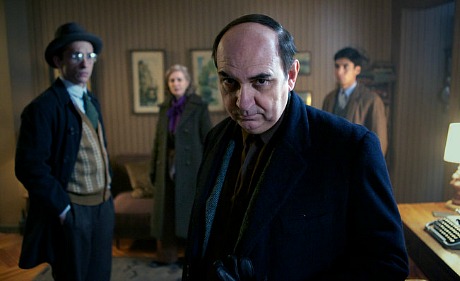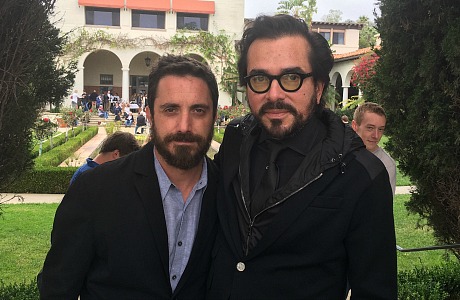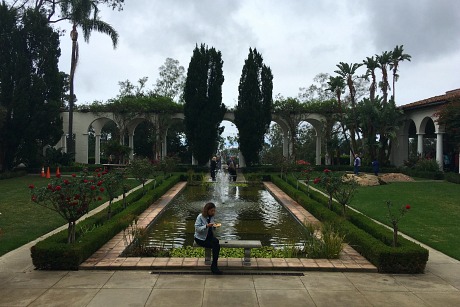I finally saw Pablo Larrain‘s Neruda (The Orchard, 12.16) yesterday. It played at Santa Barbara’s storied Riviera theatre, under the auspices of Santa Barbara Film Festival honcho Roger Durling (and with Larrain taking bows and doing a post-screening q & a.) I wasn’t head over heels in love with this late ’40s period drama, but I gradually warmed to the dream saga of a renowned poet, politician and libertine. The film knows itself, and unfolds at its own pace. Which is to say leisurely, thoughtfully. It has an undercurrent.
Neruda is not a film about intrigue and twists, or even about a chase. It’s about different approaches to living — a meditative, sensual and humanist-compassionate way of being (Luis Gnecco‘s Pablo Neruda) vs. a small subservient man (Bernal’s government cop, Oscar Peluchoneau) determined to capture and suppress a perceived enemy of the state.

Luis Gnecco as Pablo Neruda.

Neruda director Pablo Larrain, Santa Barbara Film Festival director Roger Durling during a midday lunch between screenings of Neurda and Jackie.
I liked the textures, the culture, the glimpses of this and that part of Chile. And I liked the ending quite a bit. I expected something glum and resigned, but no. And then Neruda, who lived until 1973, is shown living with a measure of comfort in Paris, which is partly indicated by a scene of a naked Neruda cavorting with naked women. (The fact that Neruda is fat is not presented as a problem or even an issue. But if I was as fat as this guy I would never take my clothes off, not even to shower.)
I’ll always remember the line “where is that fat Communist?”
But there’s no mention of Neruda‘s return to Chile, and how he became part of Salvador Allende‘s government. And how he may have been poisoned to death by a Pinochet loyalist in ’73, and right around the time Pinochet and the military overthrew the Allende government in a coup.
This is the pattern of nearly all historical films these days. You see the partial, incomplete version of a real-life event or a man’s life that the filmmaker has presented, and then you go to Wikipedia and other online sources and read the whole story, warts and all.
I didn’t care for Sergio Armstrong‘s murky, brownish, soft-focus photography. And I really didn’t care for the fact that some guy’s big, fat, crew-cutted head obstructed my view of the subtitles, which necessitated my having to lurch right and left throughout the whole film.
It was great meeting Pablo again. I could tell he was a tiny bit disappointed when I asked if Bernal’s character was in any way based on fact. Neruda has an Act Two scene between Bernal and Neruda’s wife (Mercedes Moran, who’s really good) in which she tells him “you are fiction, the poet is real and lasting.” (Or words to that effect.) I should have deduced from this that Peluchoneau is, in fact, a made-up fellow. The look in Larrain’s eyes was devastating.
Here’s what a producer friend wrote me last night: “Don’t know if you’ve seen Neruda yet, but I attended the Academy foreign film voting screening and it was widely disliked. The choice to tell the story through Bernal’s numbing compulsive voice-over made the film feel claustrophobic and sterile. And why Larrain chose to depict Neruda as such an unsympathetic asshole is a mystery.”
I told her I disagree but that’s what she wrote.













